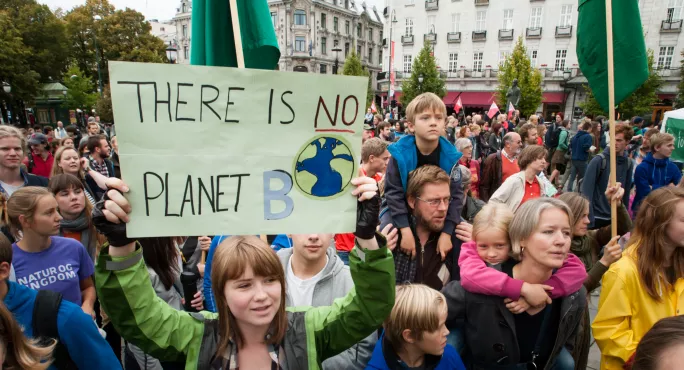“There is no Planet B” is a regular refrain heard in school climate strikes across the globe. At the last count, over 2,000 demonstrations had taken place in 123 countries. This campaign is not going away any time soon. The next strike, taking place globally on 20 September, is set to be even bigger.
Growing numbers of headteachers and academics are supporting young people in their action to put pressure on governments to take the climate crisis seriously. Time is running out and young people know that that they are the ones who will suffer.
So what can schools do to support young people to address the climate emergency? Here are eight suggestions.
1. Curriculum. Explore links to climate change across all subject areas. Introduce project-based learning to develop education for sustainability as a cross-curricular priority. Schools on the Scottish island of Islay have used project-based learning approaches to explore a range of topics, involving members of the local community in their work.
Quick read: Young climate activists told they can strike only once a year
News editor’s take: Young people deserve a voice - and schools should amplify it
One head’s message to students: Join the climate strike
Opinion: ‘Tackling the climate crisis must be a central focus of education’
2. Food. Go vegetarian. Buy local, organic food where possible. Ban junk food. Teach children how to cook healthy meals. Soil Association Scotland’s Food for Life programme helps schools provide healthy, sustainable meals. North Ayrshire Council holds a gold award for its service across 54 schools. Edinburgh schools have introduced meat-free Mondays. Every day can be a meat-free day. It saves money as well as the environment.
3. Transport. Encourage travel on foot and by bike for students, staff and families. Avoid school trips that involve flying. Review your transport policy. Living Streets organises an annual Walk to School Week. Let’s make every week Walk to School Week. Sustrans is working with schools across Scotland to transform the school run.
4. Resources. Use renewable, sustainable resources. Ban single-use plastics. Buy environmentally friendly, fairly traded products where possible. Use biodegradable cleaning materials. Recycle for Scotland supports schools in setting up a whole-school scheme. Review your school purchasing policy.
5. Energy. Switch off lights. Turn down the heating. Wear extra clothes. Insulate and ventilate. Purchase energy from renewable suppliers. Install solar panels or wind turbines. Gordon Primary and Westruther Primary in the Scottish Borders have installed solar panels on their premises, with 10 more schools to follow. Highland Council has installed wind turbines at a number of school sites.
6. Clothing. Avoid cheap uniforms imported from developing countries. Encourage suppliers to use natural and sustainable fibres. Parents at St Leonards School in Fife run a second-hand uniform shop.
7. School grounds. Grow your own veg. Teach children how to garden. Plant trees. Encourage wildlife on to the site. Learning through Landscapes Scotland helps schools to make the most of their school grounds to involve students in outdoor learning.
8. Participation. Set up a climate-crisis committee (consisting of students, staff, parents and members of the local community) to explore what your school can do. Let everyone know that each one of us can make a difference.
This is a golden opportunity for education: for students, schools and communities to work together on a shared mission that matters to us all. If schools fail to play their part in addressing this emergency, their students are likely to see education as increasingly irrelevant to the global crisis engulfing us. It’s time to rise to the challenge.
Fiona Carnie is an educator and author of Rebuilding our Schools from the Bottom Up



